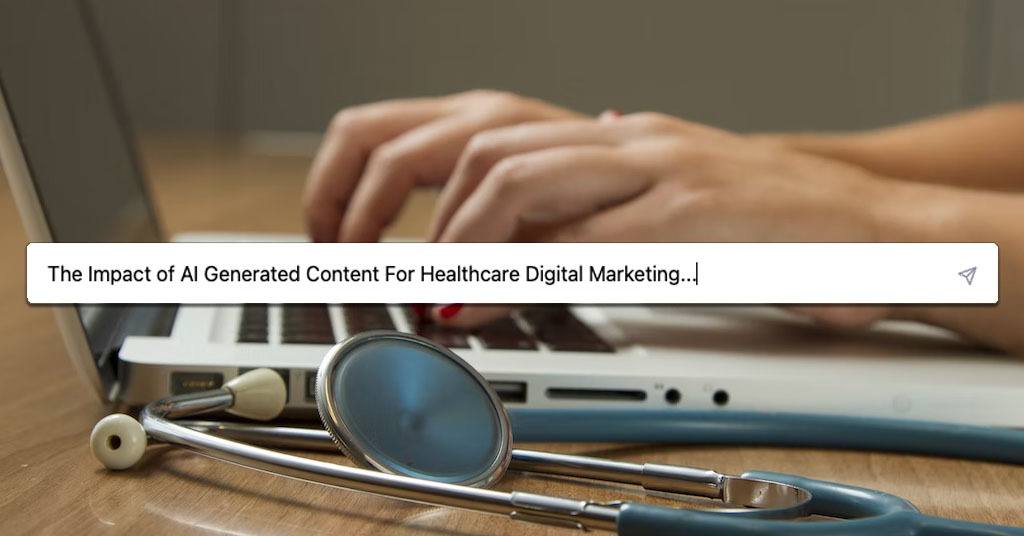The Impact of AI-Generated Content Marketing for Healthcare: Is AI Content Good for Healthcare Digital Marketing?

Artificial Intelligence has become a buzzword in the tech and marketing industry and many are asking what it means for healthcare marketing. AI has made healthcare faster and more efficient, from vaccine developments to insurance authorizations, consequently making the lives of patients and healthcare providers easier. But AI has been entering the healthcare marketing field differently – in the form of content creation.
With the emergence of AI content generator chatbots like Jasper, the playing field in content creation has changed, but what does it all mean for the creation of content for healthcare?
What is AI-Generated Content?
AI-generated content is simply any type of copy (website copy, blog posts, articles, social media copy, etc.) written by machine-learning algorithms to generate text, images, or other media based on a set of inputs or examples. The AI is then connected to larger data sets and uses that information to produce content that exemplifies the information it gathered.
There are many models of AI out there, such as ChatGPT and Jasper, that attempt to produce similar output. These models use several machine-learning techniques that attempt to produce effective results, such as:
- Supervised Learning: This is the most common type of machine learning, where the model is trained on a labeled dataset and makes predictions based on that training.
- Unsupervised Learning: In unsupervised learning, the model is not given any labeled data and instead must find patterns or structures in the input data on its own.
- Reinforcement Learning: Reinforcement learning is a type of machine learning where an agent learns how to behave in an environment by performing actions and receiving feedback as rewards or penalties.
These are just a few examples of ways that AI studies data to create content. Many of these models are still in their early phases, and while some content that is generated is useful, there are obvious concerns, especially when informing the public about their health.
How the Healthcare Industry Can Benefit From AI Content
Healthcare content is becoming an increasingly important resource for users. Sites like the Mayo Clinic and WebMD have thoroughly optimized their sites to answer questions directly related to the user’s query. Everyone has searched for their symptoms online at least once, right? And you have most likely come up with an answer highlighted right at the top of the SERPS, enticing users to further delve into the site’s content.
This content must be as accurate as possible because it is related to health and there are more health-related-specific inquiries popping up in the SERPs every day. The internet is a flood of medical information. It takes a lot of time and research to compile health-related information and compose it into the content. So, how can AI help with this process?
Time-Efficiency
AI models can scour the web at an unprecedented rate, much faster than any human could, and as previously mentioned, the web is saturated with so much health-related information. AI can cut that time in half and pull from sources it deems similar and create content promptly.
SEO-Friendliness
Appearing high in Google’s search results is one of the central goals for most healthcare organizations’ websites. With properly search engine optimized pages, AI can certainly achieve that.
When the AI is directed to create SEO-friendly content, it will crawl the web, researching pages and documents that directly compete for specific keywords and phrases, then gather data on what kinds of elements and content should also be present on your site to appear high in search results.
Fast access to this kind of competitive data can assist in creating content that will be competitive in search, thus attracting more users to the site.
Cost-Effectiveness
Accurate, high-quality content is expensive to produce, depending on the length and type of content you require. Currently, AI writing tools are much more cost-effective and do not require a lot of expertise to use.
Some tools have monthly subscriptions (like Jasper) that vary on how many words and articles you require, and others are free (like ChatGPT), but that is likely to change as these models come out of beta-testing and start being fully utilized to meet the rapidly growing demand. AI is still a much more cost-effective alternative to content output, but keep in mind that it also depends on the type and level of quality you may require.

Challenges with AI-Generated Content
Cutting costs, SEO-friendliness, and time-efficiency are all certainly things that organizations crave, but there are some factors to take into consideration before jumping on the AI content bandwagon. Because accuracy is paramount to medical information, it is important to be diligent with any content created for healthcare organizations.
Unreliable and Vague Information
Machine learning is smart, but is it very discerning? A major issue that has been recognized is that many AI programs are not always accurate or are limited in the scope of their information. This is obviously a problem if you are expecting AI to write content unsupervised and unedited. Since accuracy is so important, especially in the healthcare industry, there must be human editorial oversight.
Readers of medical and health-related content are heavily reliant on accurate and straightforward information, so when faulty content hits the web and users click on this unreliable information, your authoritativeness and reliability may take a hit and so will your appearance in the SERPS.
This does not mean that AI content is out of the question, though. All marketing content in the healthcare space should be reviewed by a medical professional and that review needs to be cited on-page. This not only provides the user with reassurance that the information is accurate, but signals the search engines and knowledge graph of reliability, as well.
Lack Of Emotion and Originality
Tone and position matter very much in content. It’s what gives content life and relatability, something AI cannot simply reproduce. In healthcare, users look for facts and figures, but they also expect some empathy, especially when dealing with health-related topics, and that can be the difference between human-produced content and AI-generated content.
It’s very easy to reproduce something that already exists on the web, and if it exists elsewhere, then what will distinguish it from yours? Opinions do not exist with AI, thus machine-created content can only restate the opinions of others.
Take time to add experience and expertise to what is created. While AI-generated content may cover all of the important points, it should be augmented with professional conjecture.
Search Engine Algorithms Versus AI
Google’s algorithm updates can sweep through and cause all kinds of flux within the web, and it is no stranger to the power of AI-created content. Google’s wavering stance on whether AI-generated content is against its policies has left many people feeling confused.
With the “helpful content” update made by Google still making waves, the algorithm is even more aware of the quality of content being produced. That being said, while there are no official penalties for producing AI-generated content, it will not tolerate “spammy, automatically-generated content.”
But what does that mean…?
Essentially, if you are using AI-generated content to solely gain visibility in search rankings and not using it to help give users more reliable and valuable content, you are violating their terms. This seems to be a bit of a gray area for most people, and many experiments have been attempted to see whether Google penalizes AI-generated content.
The results are mixed – some perform very well, and some crash. And of course, it all depends on whether or not Google has even detected the AI-generated content because there is no surefire way for Google to distinguish it.
What Google has told us is that their intent is to provide the best possible search results for any given query, regardless of how it was created.
Future Outlook
AI technology is still in its very early stages and evolving at an incomprehensible speed. As with any newly emerging technology, it will take a lot of testing to determine how best to use it when creating content in the medical and healthcare space. What we know for sure is that we cannot ignore it.
If used correctly, it can be a great tool to enhance the content creation process, but as a tool only. AI is helpful when having writer’s block, churning out wireframes for articles, and getting some new ideas. This alone can help cut down time and research for human content creation.
Clinical healthcare and medical technology is already embracing AI in so many areas, and healthcare marketers should be looking for ways to get on board, as well.
For more information about content creation, SEO, and digital marketing in the healthcare industry, get expert help from the experts at emagine. Let’s get started.

Social Media for Healthcare & Biopharma
emagineHealth outlines the critical steps you can take now to show up on social media with a proven strategy to get your message across, reach your target audiences, and accomplish your social media goals.